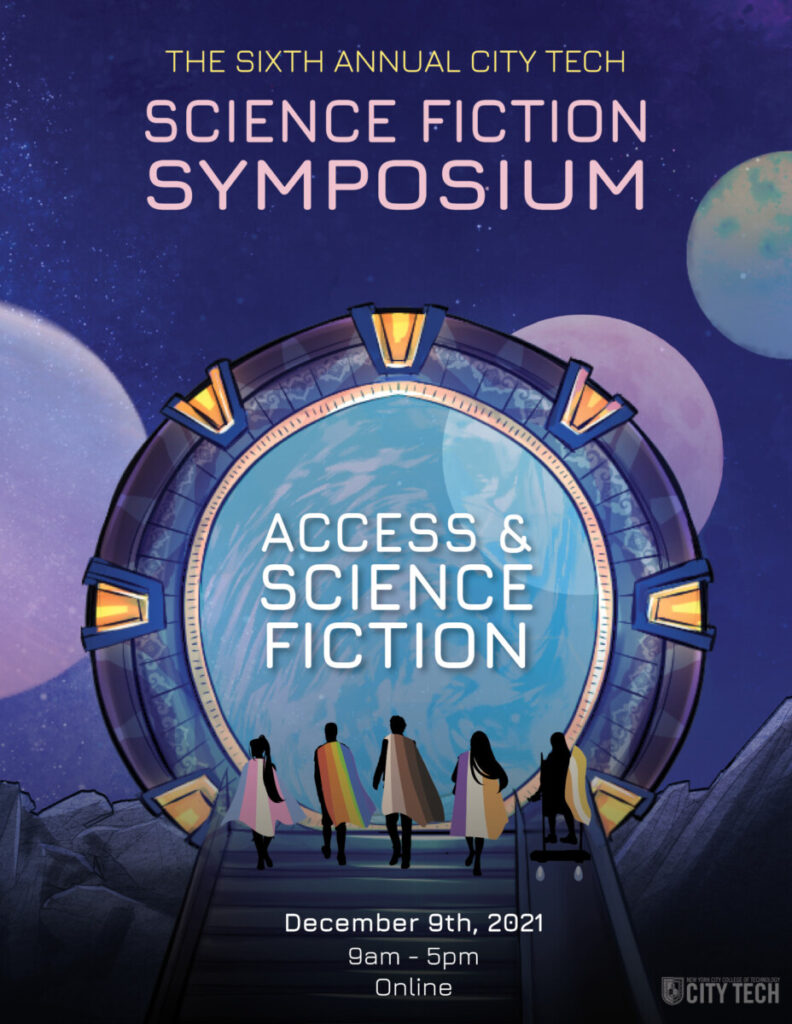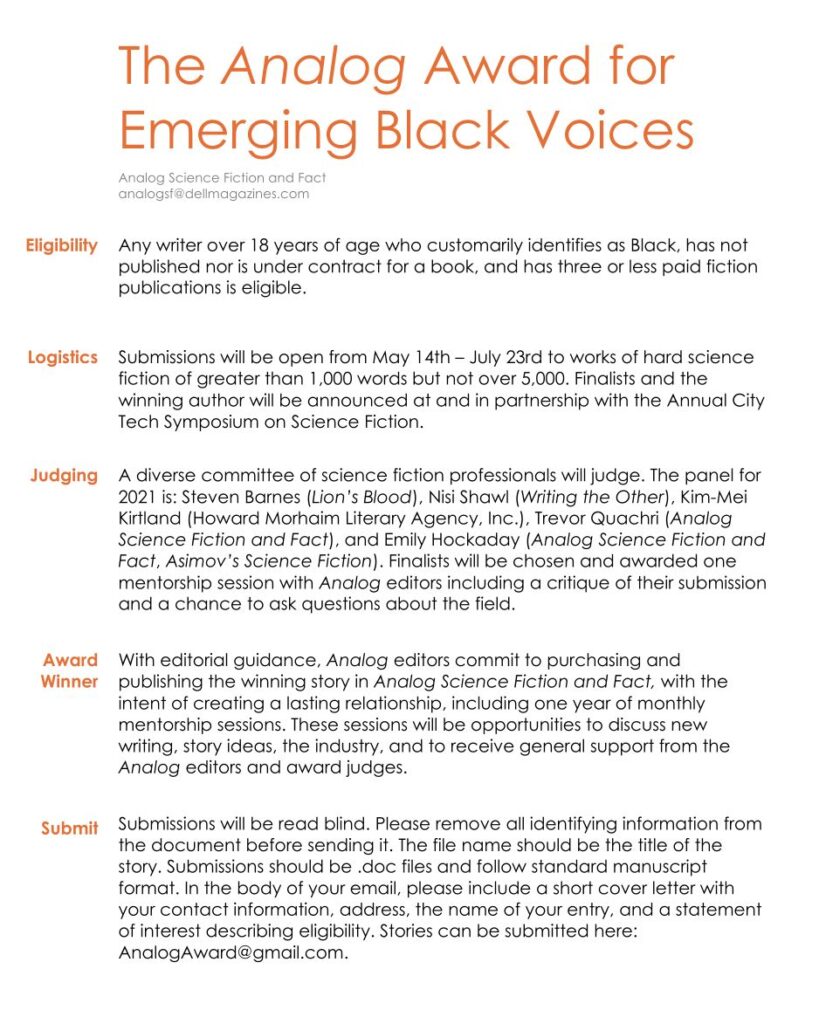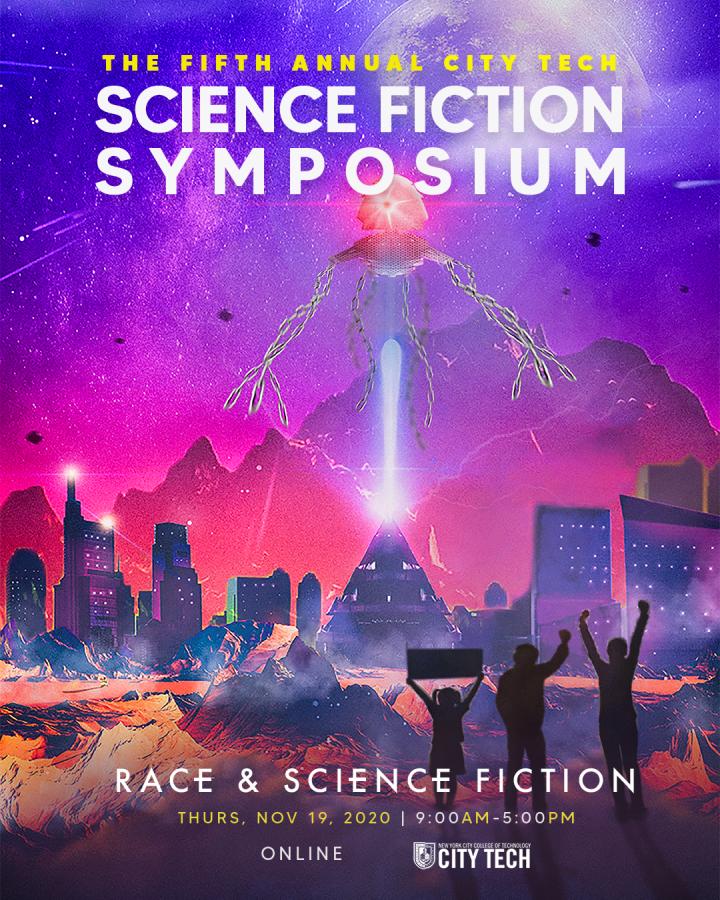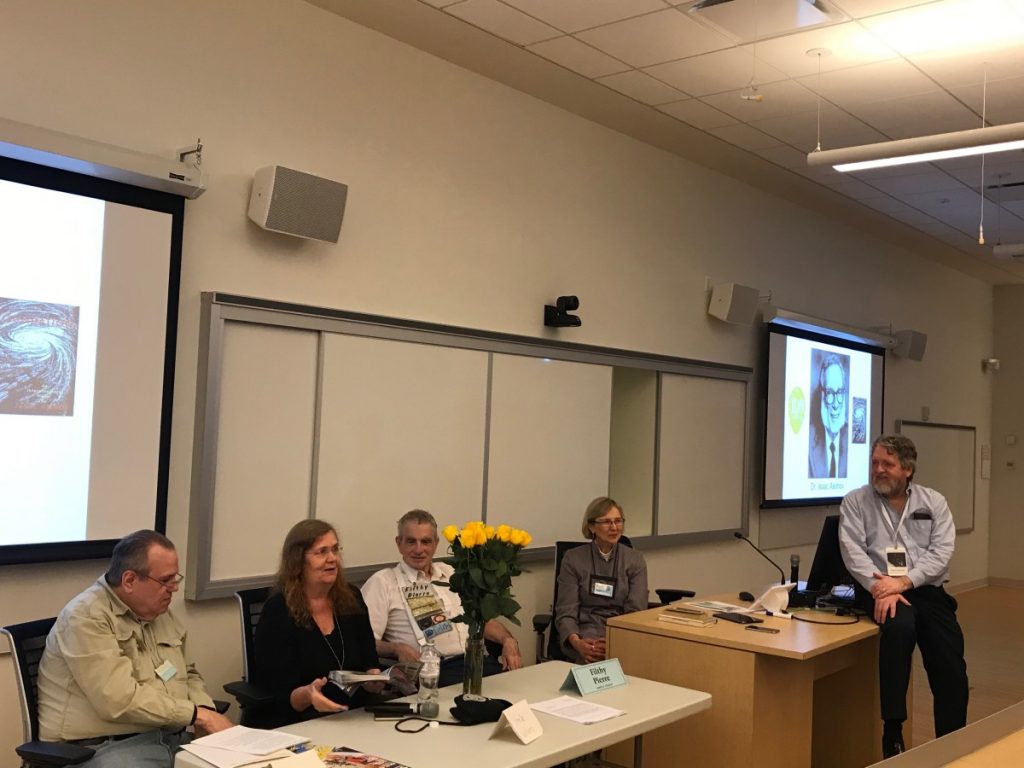
Registration and Viewing
The Sixth Annual City Tech Science Fiction Symposium on Access and Science Fiction will be held on Thursday, December 9, 2021 from 9:00am-5:00pm EST (GMT/UTC -5 hours) online via Zoom Webinar.
To participate in this free event, attendees will need to (1) Signup for a free Zoom account here (if you don’t already have one), and (2) Register here to receive access instructions to the Zoom Webinar. Participants may register any time before or during the event!
For those who would like to watch the event without registering, you can join the YouTube Livestream here (click on the top-most video labeled “Live”).
In addition to the Zoom Webinar Chat and YouTube Live Chat, join the event conversation with the event hashtag #CityTechSF and follow us on Twitter @CityTechSF.
As indicated below in the program, some symposium content is pre-recorded to offer more time for discussion on the day of the event. Pre-recorded content includes author readings and full paper presentations. Some of this content is in production and will be posted soon.
Leading up to this year’s special keynote event on “Writing Ourselves In: Teaching Writing and Science Fiction with Wikipedia” by Ximena Gallardo C. and Ann Matsuuchi, everyone is invited to join the Opening Access to SF: City Tech Science Fiction Edit-a-thon 2021 Dec. 6-Dec. 10. More information is available in this flyer.
Program
9:00am-9:15am
Opening
Jason W. Ellis
Justin Vazquez-Poritz
9:15am-10:05am
Paper Session 1: Access to International SF
Jill Belli – Moderator
Emrah Atasoy – “Access to SF in Turkey and Turkish SF Abroad”
Shanky Chandra – “Chinese Science Fiction: A Literary Genre, A Tool of Teaching Science or A Secret Weapon of China’s Soft Power?”
Gillian Polack – “The Problem of Susan Australia, or, The Tyranny of Distance” | Watch Expanded Presentation
10:05am-10:10am
Break
10:10am-11:00am
Paper Session 2: Access to Science/Fiction/World
A. Lavelle Porter – Moderator
Chris Leslie – “Reevaluating the Inclusiveness of the Interstellar Republic of Letters”
Katherine Buse and Anastasia Klimchynskaya – “Science Fiction and Citizen Science”
Aaron Zwintscher – “Star Wars Biomes: Simulacra, Nature, and Passivity in No Dialogue Nature Shows”
11:00am-11:05am
Break
11:05am-11:45am
Discussion Panel: “Accessing the Feminist Science Fiction Archive, Or, Young Women Read Old Feminist SF”
Lisa Yaszek – Moderator
Panelists:
Josie Benner
Olivia Kiklica
Jessica Taetle
Edeliz Zuleta
11:45am-11:50am
Break
11:50am-1:10pm
Paper Session 3: Access, Inclusion, and Representation in SF
Joy Sanchez-Taylor – Moderator
Leigh Gold – “Confronting Language in the Science Fiction Text: Language, Access, and Trauma in Octavia Butler and Ursula K Le Guin”
Katherine Pradt – “Shipping Supergirl: Discovering and Defending Lesbian Identity Through a DC Fandom”
Sean Scanlan – “Cool Access and Access to Cool: Gibson’s Gun Moll, Dorotea Benedetti”
Ida Yoshinaga – “Corporate Employment Practices Towards Greater Diversity of Story Development for SFF Screen Stories”
1:10pm-1:15pm
Break
1:15pm-2:25pm
Access, Accessibility, Bodies, and Minds in SF
Lucas Kwong – Moderator
Jacob Adler – “‘Everything Herein is Fantastic’: Accessibility and Inclusivity in Dungeons & Dragons”
Ryan Collis – “Autistic Speculative Imaginings: Accessing and Creating Minor Literatures”
Annette Koh – “Urban Planning for Cyborg Cities: Thinking about disabilities and mobilities in sci-fi as an urban planner”
2:25pm-2:30pm
Break
2:30pm-3:55pm
Analog Writers Panel and the Analog Emerging Black Voices Award
Emily Hockaday – Moderator
Panelists
Alec Nevala-Lee
Marie Vibbert
Chelsea Obodoechina
Trevor Quachri and Emily Hockaday – Award Presentation
3:55pm-4:00pm
Break
4:00pm-5:00pm
Keynote
“Writing Ourselves In: Teaching Writing and Science Fiction with Wikipedia”
Ximena Gallardo C. and Ann Matsuuchi
Wanett Clyde – Introduction and Moderator
Leading up to this special keynote event, everyone is invited to join the Opening Access to SF: City Tech Science Fiction Edit-a-thon 2021 Dec. 6-Dec. 10.
Ximena and Ann’s book chapter, “My Books Will Be Read By Millions of People!”: The LaGuardia Community College Octavia E. Butler Wikipedia Project,” that appears in Approaches to Teaching the Works of Octavia Butler, edited by Tarshia Stanley (Modern Language Association, 2019), has been made accessible via the CUNY institutional repository, Academic Works: https://academicworks.cuny.edu/lg_pubs/141/. This book was awarded Idaho State University’s 2021 Teaching Literature Award.
Participants
Jacob Adler has worked as the Metadata and Cataloging Librarian at the Bronx Community College Library since 2017. Before that he performed various other cataloging work, most notably at The Paley Center for Media from 2010 to 2016. In addition to his professional work he wrote a fantasy novel for the 2018 National Novel Writing Month contest; he continues to work on the novel and seek to get it published. He is especially interested in early television history, particularly the original 1959-1964 Twilight Zone television series. He is also currently pursuing a master’s degree in Museum Studies, which he is on track to receive in January 2022.
Emrah Atasoy, PhD, serves as a visiting postdoctoral scholar at University of Oxford’s Faculty of English between September 2021 and September 2022 as a recipient of the TUBITAK (The Scientific and Technological Research Council of Turkey) 2219 International Postdoctoral Research Fellowship Grant. His research interests include speculative fiction, futuristic narratives, critical future studies, utopian and dystopian studies, critical dystopia, science fiction, apocalyptic fiction, ecocriticism, posthumanism, Turkish speculative fiction, twentieth-century literature, and comparative literature. He was a visiting scholar at Penn State University under the supervision of Prof. Dr. Jennifer Wagner-Lawlor in the academic year 2015-16. His work has appeared in journals such as Studies in the Novel (2022, collaborative article with Prof. Dr. Thomas Horan), Utopian Studies, Librosdelacorte.es, Literary Voice, and Methis. Studia Humaniora Estonica. His monograph Epistemological Warfare and Hope in Critical Dystopia has been published by Nobel in 2021. His most recent publications include “Speculative Fiction Studies in Turkey: A Preliminary Survey” (2021), in Utopian Studies, “Dys/utopian Narratives on the Screen: Beyond the Binaries in Children of Men and Lobster” (2021), in The Postworld In-Between Utopia and Dystopia: Intersectional, Feminist, and Non-Binary Approaches in 21st Century Speculative Literature and Culture (2021, Routledge), edited by Tomasz Fisiak and Katarzyna Ostalska, and “Epistemological Warfare(s) in Dystopian Narrative: Zülfü Livaneli’s Son Ada and Anthony Burgess’s The Wanting Seed” in Speculations of War: Essays on Conflict in Science Fiction, Fantasy and Utopian Literature (2021, McFarland), edited by Annette M. Magid. He is a member of both Utopian Studies Society-Europe and the Society for Utopian Studies (SUS). His research at the University of Oxford is supported by TUBITAK BIDEB (The Scientific and Technological Research Council of Turkey) under Grant 2219-International Postdoctoral Research Fellowship Program.
Jill Belli is Associate Professor of English at New York City College of Technology, CUNY, where she happily teaches science fiction and utopian studies often. She’s working on long-standing projects on well-being & happiness in education and writing & revising in dystopian texts. Newer interests include looping as composing practice, tarot and astrology as storytelling and knowing, William Reynolds, and grief. Learn more about Jill and her interdisciplinary research and teaching: jillbelli.org.
Josie Benner is a Biomechanical Engineering Major and Science Fiction Minor at Georgia Tech. She works in Professor Lisa Yaszek’s Sci Fi Lab, with funding from Georgia Tech’s Center for Women, Science, and Technology and the Ivan Allen College for the Liberal Arts.
Katherine Buse uses methods from science and technology studies, science fiction studies, and the environmental humanities to study how science shapes and is shaped by its cultural milieu. She is working on a book project, titled Speculative Planetology: Science, Culture, and the Building of Model Worlds. It describes planetary world building, or speculative planetology, as a set of shared practices built up between planetary and climate scientists, creators of speculative fiction, engineers, and policymakers since the middle of the 20th century. She also studies and designs video games, including being on the design team for Foldit: First Contact, a new narrative version of the citizen science video game Foldit. She received her Ph.D in English with an emphasis in Science and Technology Studies at the University of California, Davis in 2021. As a Marshall Scholar, she received an MA in Science Fiction Studies at the University of Liverpool and an MPhill in Criticism and Culture at Cambridge.
Shanky Chandra is a Ph.D. scholar from the Centre for Chinese and Southeast Asian Studies, Jawaharlal Nehru University, India, in New Delhi. His research interests include modern and contemporary Chinese Science Fiction. The title of his Ph.D. thesis is “Socio-Political and Cultural Factors in the Making of Chinese Science Fiction Writer Liu Cixin: Understanding The Three-Body Problem.” Chandra took his B.A. (2011) and M.A. (2013) in Chinese language and literature, and M.Phil. (2016) from Jawaharlal Nehru University at New Delhi, India. In 2013, the Ministry of Human Resource Development (MHRD) awarded the Chinese Government Scholarship to Shanky Chandra for Post Graduate Diploma at Beijing Language & Culture University (Higher level 1 & 2) 2013-2014. Chandra taught Chinese language and literature at St. Stephen’s College (2014-2019), Delhi University. He completed the Advance Mandarin Teacher Training Program from the National Taipei University of Education Chinese Language Education Center, Taipei, Taiwan, in July 2018. Recently, he spent one year at the Department of Modern and Contemporary Chinese Language and Literature at the School of Chinese Language and Literature of Beijing Normal University (BNU) as a senior visiting scholar under the supervision of Prof. Wu Yan (HYI fellowship). He is also a member of the International Forum of Chinese Language Teachers (国际汉语教师微信群) and its official Account e-journal (国际汉语教师500强公众号). Currently, he is a visiting fellow at Harvard Yenching Institute, Harvard University.
Ryan Collis is a second year PhD student in Education at York University in Ontario, Canada who researches the creation of learning spaces for autistic students. He holds degrees in English (BA, Queen’s ‘99), Computer Science (BScH, Queen’s ‘00), Education (BEd, OISE ‘05), and Science and Technology Studies (BScH, York ’19; MA, York ‘20). Ryan has been a high school teacher in the York Region District School Board since 2006 and is a founding member of the editorial board of the Canadian Journal of Autism Equity. Ryan lives with his wife and son in Ajax, Ontario.
Jason W. Ellis is an Associate Professor of English at the New York City College of Technology, CUNY, where he coordinates the City Tech Science Fiction Collection. He coedited The Postnational Fantasy: Postcolonialism, Cosmopolitics and Science Fiction (McFarland, 2011) and a special issue on Star Wars: The Force Awakens of New American Notes Online, and talked with Dr. Neil deGrasse Tyson about the relationship between SF and society on StarTalk Radio. He holds a Ph.D. in English from Kent State University, M.A. in Science Fiction Studies from the University of Liverpool, and B.S. in Science, Technology, and Culture from Georgia Tech.
Ximena Gallardo C. is a professor of English at LaGuardia Community College-CUNY. She has been a Wikipedia editor since 2012 and a WikiEducation instructor since 2014. Among her current Wikimedia projects are The LaGuardia WikiProject Octavia E. Butler and the LaGuardia and Wagner Archives GLAM initiative, as well as the Wikibooks projects Perspectives in Digital Literacy and Themes in Literature.
Leigh Dara Gold received her doctorate in German Literature in 2011 from New York University. She teaches Introduction to Poetry and English 1121 at New York City College of Technology, and Ancient Literature and Composition at Borough of Manhattan Community College. Her current research interests include science fiction’s role in the classroom, research on Ursula K. Le Guin, and connections between dance, literature, and philosophy.
Emily Hockaday is the managing editor and poetry editor for Asimov’s Science Fiction and Analog Science Fiction and Fact. Her first full-length poetry collection, Naming the Ghost, will be out in November 2022 with Cornerstone Press. You can find her online at www.emilyhockaday.com or @E_Hockaday.
Olivia Kiklica is a Computational Media Major and Science Fiction Fellow at Georgia Tech. She works in Professor Lisa Yaszek’s Sci Fi Lab, with funding from Georgia Tech’s Center for Women, Science, and Technology and the Ivan Allen College for the Liberal Arts.
Anastasia Klimchynskaya’s research brings together literary theory, sociology, and neuroscience to study how storytelling and narrative shape what (we believe) we know about the world. She received her PhD in Comparative Literature from the University of Pennsylvania, focusing on the way science fiction emerged as a literary form in the nineteenth century to express a new social and technoscientific paradigm. Her book project extends this work into the twenty-first century, using the two periods as foils for each other to examine how our fictions shape the innovation, use, and understanding of technoscientific advancements – and, in turn, how these advancements shape the very form of the stories we tell.
Annette Koh is a lecturer in the department of urban and regional planning at California State Polytechnic University, Pomona. Her work and teaching focus on the politics of participation, youth engagement, and placemaking. An obsession with narrative and speculative approaches to city planning has manifested in an essay The Right to the City: Urbanism, Planning and Cities in Science Fiction and Fantasy, the chapter “Unofficial Archives of Urban Life How to Rewrite the Canon of Cities” for a tumblr book and a world-building workshop in October 2021 for an urban planning studio at Hunter College. She wrote two essays for ProgressiveCity.net – Placemaking When Black Lives Matter; Decolonial Planning in North America – which were then published in the book Transformative Planning: Radical Alternatives to Neoliberal Urbanism. In 2017 and 2018, she collaborated with fellow PhD students and faculty to co-organize the Decolonizing Cities symposia at the University of Hawai‘i at Manoa.
Lucas Kwong is an assistant professor of English at New York City College of Technology. His scholarship on fantastic fiction, religion, and colonialism has been published in Victorian Literature and Culture, Religion and Literature, and Journal of Narrative Theory. He also serves as the assistant editor for New American Notes Online, an online interdisciplinary scholarly journal, and as editor for City Tech Writer, a journal of student writing. He lives in Brooklyn with his wife.
Chris Leslie (he/him) is a visiting professor at the South China University of Technology whose research investigates the interactions among science, technology, and society. This paper is based on the research for his book From Hyperspace to Hypertext: Masculinity, Globalization, and Their Discontents, which will be published by Palgrave in 2022. Dr. Leslie is chair of the IFIP working group on the history of computing and a creative consultant for Zhejiang Hexin Toy Group in Yunhe, China.
Ann Matsuuchi is an instructional technology librarian and professor at LaGuardia Community College-CUNY. Past writing projects include those that focus on Samuel R. Delany and Wonder Woman, sf tv shows such as Doctor Who, and Asian American comic books. Ann teaches digital literacy, online cultures, and the fundamentals of internet studies. Current projects include one that focuses on Melvin Van Peebles, and a reference guide to Delany’s works.
Alec Nevala-Lee was a 2019 Hugo and Locus Award finalist for Astounding: John W. Campbell, Isaac Asimov, Robert A. Heinlein, L. Ron Hubbard, and the Golden Age of Science Fiction (Dey Street Books / HarperCollins), which was named one of the best nonfiction books of the year by The Economist. He is the author of three suspense novels from Penguin, including The Icon Thief, and his work has appeared in such publications as the New York Times, the Los Angeles Times, Salon, The Daily Beast, Analog Science Fiction and Fact, and two editions of The Year’s Best Science Fiction. His next book, Inventor of the Future: The Visionary Life of Buckminster Fuller, will be published by HarperCollins on August 2, 2022.
Evelyn Ng is a City Tech Communication Design student with a focus on illustration. She’s designed and illustrated the poster for “The Sixth Annual City Tech Science Fiction Symposium on Access and Science Fiction”. When she isn’t working, she spends her time looking through art publications to elevate her design techniques. See more of her work on Instagram and on her online portfolio.
Chelsea Obodoechina is a graduate student and teaching assistant. In her spare time, she writes short speculative fiction inspired by her academic background in sociology. Her works have been featured in Cast of Wonders, the Unfettered Hexes anthology, and Anathema: Spec from the Margins. She lives in Montreal, Canada with her family.
Gillian Polack, Ph.D. is an Australian speculative fiction writer based in Canberra, Australia. She was the 2020 recipient of the Ditmar (best novel, for her 2019 novel The Year of the Fruit Cake) and the Bertram A. Chandler (lifetime achievement in science fiction) awards. She is an ethnohistorian with a special interest in how story transmits culture, both Medieval and modern. Her current research examines how contemporary speculative fiction novels serve as vectors for cultural transmission. A study of this will be released in 2022 (Story Matrices: Cultural Encoding and Cultural Baggage in the Worlds of Science Fiction and Fantasy, Academic Lunare). Her research at Deakin University furthers this work. Dr Polack’s publications include ten novels, short stories, a monograph (History and Fiction, shortlisted for the William Atheling Jr Award for Criticism or Review) and various works of non-fiction. A list of her books can be found at https://gillianpolack.com/my-books/.
A. Lavelle Porter is an Assistant Professor of English at New York City College of
Technology. He holds a B.A. in history from Morehouse College and a Ph.D. in
English from the CUNY Graduate Center. His writing has appeared in venues such as
The GC Advocate, Callaloo, The New Inquiry, Poetry Foundation, and the African
American Intellectual History Society. He recently published The Blackademic Life: Academic Fiction, Higher Education, and the Black Intellectual with Northwestern University Press.
Katherine Pradt is a librarian at the Graduate Center of the City University of New York. In addition to supporting academic research and answering citation style questions (and troubleshooting the printers), she works to connect scholars to open-source tools and open access resources. She holds an MFA in addition to her library degree and is writing a novel set in occupied New York during the Revolutionary War.
Trevor Quachri, who took the reins of Analog Science Fiction and Fact as editor in 2012, started off as an editorial assistant in 1999 and worked his way up the ladder at Analog and Asimov’s Science Fiction, under Stanley Schmidt, Sheila Williams, and Gardner Dozois, respectively. On top of that, he’s also been a Broadway stagehand, collected data for museums, and executive produced a science fiction pilot for a basic cable channel. He lives in New Jersey with his fiancée, daughter, and way, way too many comic books.
Joy Sanchez-Taylor is a Professor of English at LaGuardia Community College (CUNY) whose research specialty is intersections between science fiction, fantasy, and critical race theory. Her book Diverse Futures: Science Fiction and Authors of Color (2021) examines the contributions of late twentieth and twenty-first century U.S. and Canadian science fiction authors of color to the genre. Dr. Sanchez-Taylor is currently working on a monograph project on diverse fantasy representations.
Sean Scanlan is Associate Professor of English at New York City College of Technology—CUNY where he specializes in literary technologies and American and global literature. He published “Global Homesickness in William Gibson’s Blue Ant Trilogy,” for the collection The City after 9/11: Literature, Film, Television (2016), and he is the founder and editor of NANO: New American Notes Online.
Jessica Taetle is a Computational Media Major and Science Fiction Fellow at Georgia Tech. She works in Professor Lisa Yaszek’s Sci Fi Lab, with funding from Georgia Tech’s Center for Women, Science, and Technology and the Ivan Allen College for the Liberal Arts.
Justin Vazquez-Poritz is the Dean of the School of Arts and Sciences at New York College of Technology, CUNY.
Marie Vibbert has sold over 70 short stories to professional publications such as Analog Science Fiction & Fact, The Magazine of Fantasy & Science Fiction, Nature, Vice’s Motherboard, Lightspeed, Escape Pod, and more. Her works have been translated into Chinese and Vietnamese. Her debut novel, Galactic Hellcats, came out in 2021. Publisher’s Weekly called it “A rip-roaring space heist.” By day she is a computer programmer at Case Western Reserve University.
Lisa Yaszek is Regents’ Professor in the School of Literature, Media, and Communication, where she explores science fiction as a global language crossing centuries, continents, and cultures. Yaszek’s books include Galactic Suburbia: Recovering Women’s Science Fiction (Ohio State, 2008); Sisters of Tomorrow: The First Women of Science Fiction (Wesleyan 2016); The Future is Female! 25 Classic Science Fiction Stories by Women (Library of America, 2018); and Literary Afrofuturism in the Twenty-First Century (co-edited with Isiah Lavender III, Ohio State, 2020). Her ideas have been featured in The Washington Post, Food and Wine Magazine, and USA Today, and she has been an expert commentator for the BBC4’s Stranger Than Sci Fi, Wired.com’s Geek’s Guide to the Galaxy, and the AMC miniseries James Cameron’s Story of Science Fiction. A past president of the Science Fiction Research Association, Yaszek currently serves as a juror for the John W. Campbell and Eugie Foster Science Fiction Awards.
Ida Yoshinaga is an Assistant Professor of Science Fiction Film at the Georgia Institute of Technology, and her screen-studies research centers on the production relations between creative labor from racial/gender/class minority groups and majority-dominated management, within corporate transmedia. Along with workplace allyship between these two unequal statuses, she studies the global stratification of SFF-genre scriptwriting within the story development process, as well as produces and facilitates the development of cultural screenplays for Indigenous or 4th cinema and TV.the development of cultural screenplays for Indigenous or 4th cinema and TV.
Edeliz Zuleta is a Biomechanical Engineering Major and Science Fiction Minor at Georgia Tech. She works in Professor Lisa Yaszek’s Sci Fi Lab, with funding from Georgia Tech’s Center for Women, Science, and Technology and the Ivan Allen College for the Liberal Arts.
Aaron Zwintscher is an adjunct professor of English at the New York City College of Technology. He is also an ambient musician and noise artist.








